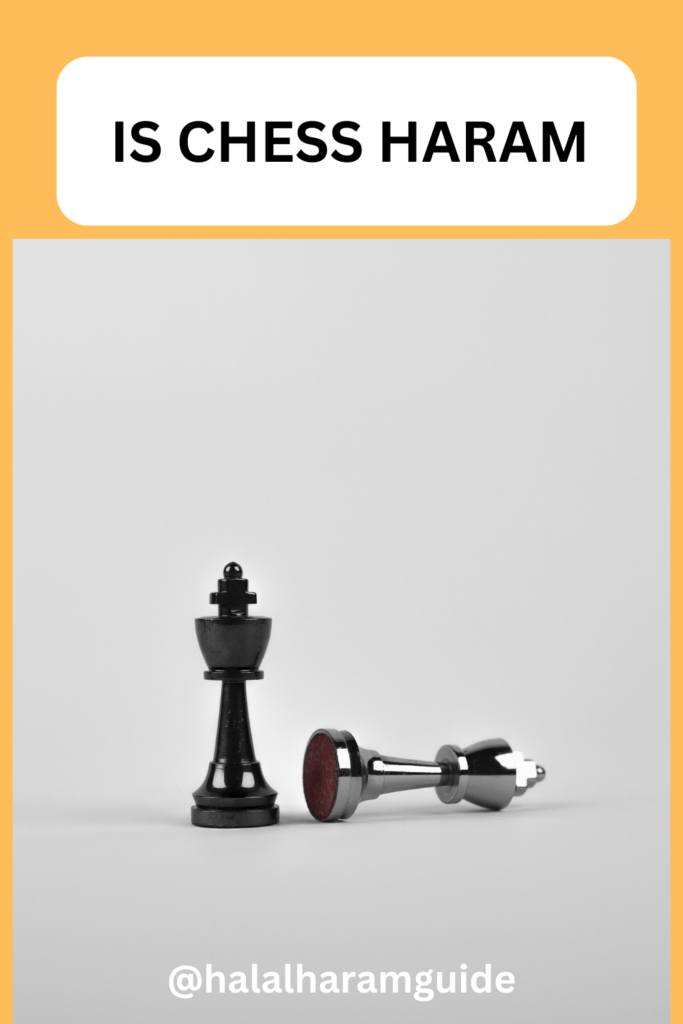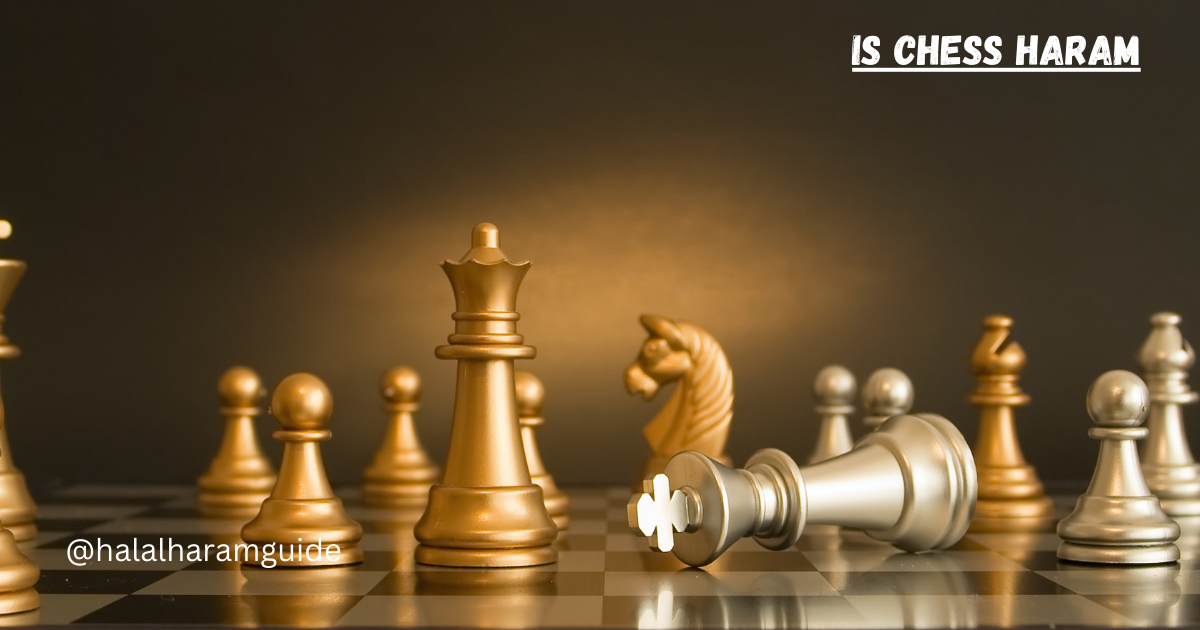Let’s talk about the topic “Is Chess Haram”
Chess is a game that has been enjoyed by millions of people for centuries, known for its strategy and intellectual challenges.
However, in some discussions within the Islamic community, questions have arisen about whether playing chess is haram or forbidden according to Islamic teachings. This blog post aims to provide a straightforward and easy-to-understand explanation of the debate surrounding the permissibility of chess in Islam.
We will explore various perspectives and arguments on this topic, helping you gain a better understanding of whether chess is considered haram in Islam.
What is Chess?
Chess is a two-player strategy board game that is played on an 8×8 grid known as a chessboard. Each player controls an army of 16 pieces: one king, one queen, two rooks, two knights, two bishops, and eight pawns. The objective of the game is to checkmate the opponent’s king, which means putting the king in a position where it is under attack and cannot escape capture.
Chess is a game of skill, strategy, and tactics. Each type of piece moves in a specific way:
King: The king can move one square in any direction (horizontally, vertically, or diagonally).
Queen: The queen can move horizontally, vertically, or diagonally across the board.
Rook: The rook moves horizontally or vertically, but not diagonally.
Knight: Knights move in an L-shape: two squares in one direction (either horizontally or vertically) and then one square perpendicular to that.
Bishop: Bishops move diagonally across the board.
Pawn: Pawns move forward one square at a time, but capture diagonally. On their first move, pawns have the option to move forward two squares.
Chess is a game that requires strategic thinking, planning, and foresight. It is often considered one of the most intellectually challenging board games, as players need to anticipate their opponent’s moves and formulate strategies to control the board. Chess is played worldwide and has a rich history, with various national and international competitions and championships. It is also a popular subject for study and analysis in the realm of artificial intelligence and computer science, with computers capable of playing at a very high level.
Is chess Haram in Islam?
The permissibility of playing chess in Islam has been a subject of debate among Islamic scholars throughout history, and there isn’t a unanimous consensus on its status. The view on chess varies among different schools of thought and scholars.
Permissible (Halal) Opinion: Some scholars and Muslim communities consider chess to be permissible or halal as long as it doesn’t lead to any negative consequences or take away from one’s religious obligations. They argue that chess is a game of skill and strategy, similar to other permissible games, and can be enjoyed in moderation.
Prohibited (Haram) Opinion: Other scholars and Islamic traditions have deemed chess as haram or prohibited. They argue that chess can be distracting, time-consuming, and may lead to gambling-like behaviour or neglect of religious duties. Some historical scholars held this view, considering chess as a waste of time and a potentially harmful activity.
The permissibility of chess can also depend on the intentions and context of the players. If chess is played purely for entertainment and doesn’t lead to any negative consequences or neglect of religious duties, some scholars may consider it acceptable. However, if it becomes an obsession or leads to neglect of religious obligations, it may be discouraged or prohibited by some religious authorities.
How To Play Chess And Stay Within Islamic Guidelines
To play chess and stay within Islamic guidelines, it’s important to approach the game with moderation and mindfulness of one’s religious duties. Here are some guidelines to consider:
Intentions: Play chess with the right intentions, treating it as a recreational activity for mental stimulation and entertainment rather than an obsession or addiction that could distract from religious obligations.
Time Management: Be mindful of the time spent playing chess and ensure that it doesn’t interfere with daily prayers, religious study, or other important religious activities.
Avoid Gambling: Do not involve any form of gambling or betting while playing chess, as gambling is considered haram in Islam.
Respect Opponents: Treat your opponents with respect and fairness during the game, avoiding any negative behaviour or disputes.
Balanced Lifestyle: Maintain a balanced lifestyle that includes physical activity, social interactions, and religious commitments in addition to playing chess.
Seek Knowledge: Study and understand the rulings and opinions of Islamic scholars regarding chess in your specific cultural and religious context.
Local Guidance: Seek guidance from local religious authorities or scholars who are knowledgeable about your community’s customs and beliefs regarding chess.
Why Is It Haram To Play Chess In Islam?
The prohibition of playing chess in Islam is not a universally agreed-upon stance, and there are differing opinions among Islamic scholars and schools of thought regarding its permissibility. The view that chess is haram (forbidden) in Islam is based on the following arguments made by some scholars and traditions:
Distraction from Religious Duties: Some scholars argue that chess can be a time-consuming and mentally absorbing game that may distract individuals from their religious obligations, such as daily prayers, Quranic study, and other religious duties. Excessive engagement in any activity that hinders one’s religious responsibilities is discouraged in Islam.
Potential for Gambling: Chess has historically been associated with gambling, especially in some cultural contexts. Gambling is explicitly prohibited in Islam due to its negative social and financial consequences, and some scholars link chess with this aspect.
Negative Influence: There is concern among some scholars that intense competition in chess may lead to negative emotions, disputes, or even aggression among players, which goes against the Islamic principles of peace and harmony.
It’s important to note that the prohibition of chess in Islam is not universally accepted. Many other scholars and Muslim communities consider chess to be a permissible and intellectually stimulating game as long as it is played in moderation and does not lead to any harmful consequences or neglect of religious duties. The permissibility of chess can vary based on cultural and regional factors, as well as individual interpretations of Islamic teachings. Muslims who are uncertain about whether chess is permissible in their specific context should seek guidance from their local religious authorities or scholars.
What is the Perspective of Muslim Scholars on Playing Chess?
The perspective of Muslim scholars on playing chess varies across different schools of thought and interpretations of Islamic jurisprudence. There is no universally agreed-upon stance on chess in Islam, and scholars’ opinions range from permissibility to prohibition. Here are the main viewpoints:
Permissible (Halal): Some scholars and Muslim communities consider chess to be a permissible and intellectually stimulating game. They argue that when played in moderation and without any negative consequences, chess can be a recreational activity that enhances strategic thinking and mental acuity.
Discouraged but Not Haram: Other scholars may discourage the playing of chess due to concerns about time consumption and potential distraction from religious duties. However, they do not outright declare it as haram (forbidden) and leave it to individual discretion, emphasising that the negative aspects of chess, such as obsession or neglect of religious obligations, should be avoided.
Prohibited (Haram): A minority of scholars and Islamic traditions consider chess to be haram. They base this opinion on concerns that chess can lead to obsession, disputes, or gambling-like behaviour, which goes against Islamic principles of moderation, peace, and avoidance of harmful activities.
The perspective of Muslim scholars on playing chess can also be influenced by cultural and regional factors. As a result, the permissibility or prohibition of chess can vary from one community to another. Ultimately, Muslims who are unsure about whether playing chess aligns with their religious beliefs should seek guidance from their local religious authorities or scholars who are knowledgeable about their specific cultural and religious context.
What does the Quran say about Chess?
The Quran, the holy book of Islam, does not specifically mention chess or provide direct guidance on whether playing chess is permissible or prohibited. Chess, as a game, did not exist during the time of the Quran’s revelation, which occurred over 1,400 years ago. Therefore, there are no direct references to chess in the Quran.
Islamic jurisprudence, including rulings on various activities and forms of entertainment, is typically derived from the Quran and the Hadith (the sayings and actions of the Prophet Muhammad). Since chess did not exist during the Prophet Muhammad’s time, scholars have relied on analogical reasoning (qiyas) and consensus (ijma) within the Islamic legal tradition to form opinions on its permissibility.
As mentioned earlier, the perspective of Muslim scholars on playing chess varies, with some considering it permissible, others discouraging it, and a minority considering it prohibited. These opinions are often based on scholars’ interpretations of Islamic principles and how they apply to the game of chess. Muslims who seek guidance on whether playing chess is permissible in their specific context should consult with their local religious authorities or scholars.
Chess is Haram, proven with Hadith
One of the hadith frequently cited by those who hold the view that chess is haram is attributed to the Prophet Muhammad. This hadith is narrated in various forms and wordings, and its authenticity is a matter of debate. In one version, the Prophet reportedly said, “He who played chess is like one who dyed his hand with the flesh and blood of swine.” This is interpreted by some scholars as a strong condemnation of chess, as it associates it with impurity.
As a result, the view that chess is haram is not universally agreed upon, and many Muslims consider chess to be permissible, especially when played in moderation and without harmful consequences. Muslims who seek guidance on this matter should consult with their local religious authorities or scholars to understand the prevailing opinion in their specific context.
Conclusion
In conclusion, whether chess is considered haram (forbidden) in Islam is a subject of differing opinions among scholars and communities. While some may view it as impermissible due to concerns about time consumption or potential distractions, others consider it permissible, particularly when played in moderation and without negative consequences.
The permissibility of chess in Islam depends on individual interpretations, cultural contexts, and the intentions of the players. Muslims seeking guidance on this matter should consult with their local religious authorities or scholars to understand the prevailing opinion in their specific context.
FAQs
Is it haram to play chess in Islam?
The permissibility of playing chess in Islam is not universally agreed upon. Some scholars and Islamic traditions consider it haram, while others do not. It depends on individual interpretations and cultural contexts.
Is it haram to play chess for fun?
Whether playing chess for fun is considered haram or not can vary among scholars and communities. Some consider it permissible as long as it doesn’t lead to harmful consequences or neglect of religious duties, while others may discourage it.
Is it haram to play chess online?
Playing chess online falls under the same considerations as playing chess in person. The permissibility depends on individual interpretations and the intentions of the players.
Is playing chess allowed in Islam?
Chess is allowed in Islam according to some scholars and Muslim communities, provided it is played in moderation and without harmful consequences. Others may discourage it.
Is chess haram without gambling?
The permissibility of chess is not solely related to gambling. Even without gambling, scholars may have differing opinions on whether it is haram or permissible based on other considerations.
Is chess haram in Shia Islam?
Chess, like in Sunni Islam, is a subject of debate in Shia Islam. Opinions on its permissibility can vary among Shia scholars and communities. Some may consider it haram, while others may permit it.
- “Is Lobster Halal? Understanding Its Permissibility”
- “Is Drawing Haram in Islam? Understanding the Perspective”
- “Is Fermented Kimchi Halal? Exploring Kimchi’s Halal Status”
- “Is Collagen Halal? Unveiling the Halal Status of Collagen”
- “Is Wine Vinegar Halal? Unveiling Its Permissibility”


